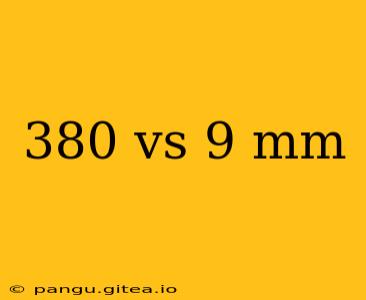Choosing the right caliber for self-defense or sport shooting can be a daunting task. Two popular choices often find themselves in direct comparison: the .380 ACP (also known as 9mm Kurz or 9x17mm) and the 9mm Parabellum (9x19mm). This article will delve into a detailed comparison of these two calibers, examining their ballistics, recoil, stopping power, and suitability for various applications. By the end, you'll have a clearer understanding of which caliber best fits your needs.
Ballistics and Performance: A Head-to-Head Comparison
The most significant difference between the .380 ACP and the 9mm lies in their ballistics. The 9mm round boasts considerably higher muzzle energy and velocity. This translates to a flatter trajectory and greater range, making it more effective at longer distances.
Muzzle Energy and Velocity:
- 9mm: Typically delivers significantly higher muzzle energy and velocity, resulting in a more powerful impact.
- .380 ACP: Offers lower muzzle energy and velocity, limiting its effective range and stopping power.
Penetration and Expansion:
Both calibers utilize a variety of ammunition types, including jacketed hollow points (JHPs) designed for expansion upon impact. However, the higher velocity of the 9mm generally leads to better penetration and expansion, especially in heavier bullet weights. The .380 ACP, while capable of expansion, might struggle to penetrate deeply enough in certain situations.
Recoil and Shootability: Which is Easier to Manage?
Recoil is a crucial factor for many shooters, especially those new to firearms or with smaller builds.
Recoil Characteristics:
- .380 ACP: Generally exhibits significantly less recoil than the 9mm, making it easier to control and shoot accurately, even for beginners.
- 9mm: Produces more noticeable recoil, potentially impacting accuracy and comfort, especially during rapid firing.
Stopping Power: The Crucial Factor for Self-Defense
Stopping power is a complex topic and depends on various factors beyond caliber alone, including shot placement, bullet type, and the target's physiology. However, the 9mm generally possesses a greater potential for stopping power due to its higher energy transfer.
Stopping Power Considerations:
- 9mm: Higher muzzle energy generally equates to a greater likelihood of incapacitating an attacker.
- .380 ACP: While capable of self-defense, its lower energy might require more precise shot placement to achieve the same stopping effect as the 9mm.
Concealed Carry: Size and Capacity Considerations
For concealed carry, both calibers are viable options, but their characteristics influence the choice.
Concealability and Capacity:
- .380 ACP: Smaller and lighter firearms chambered in .380 ACP are more readily concealable, often preferred for pocket carry. However, magazine capacity is typically lower.
- 9mm: While slightly larger and heavier, 9mm firearms offer higher magazine capacity, providing more rounds for self-defense situations.
Conclusion: Choosing the Right Caliber for You
The "best" caliber depends entirely on your individual needs and priorities. The 9mm offers superior ballistics, greater stopping power, and higher capacity, making it a popular choice for self-defense and sport shooting. However, the .380 ACP's lighter recoil and smaller size make it ideal for those prioritizing concealability and ease of handling, particularly beginners or individuals with smaller frames. Careful consideration of your specific requirements is paramount before making a decision. Consider seeking professional guidance from experienced shooters or firearms instructors to make an informed choice.
